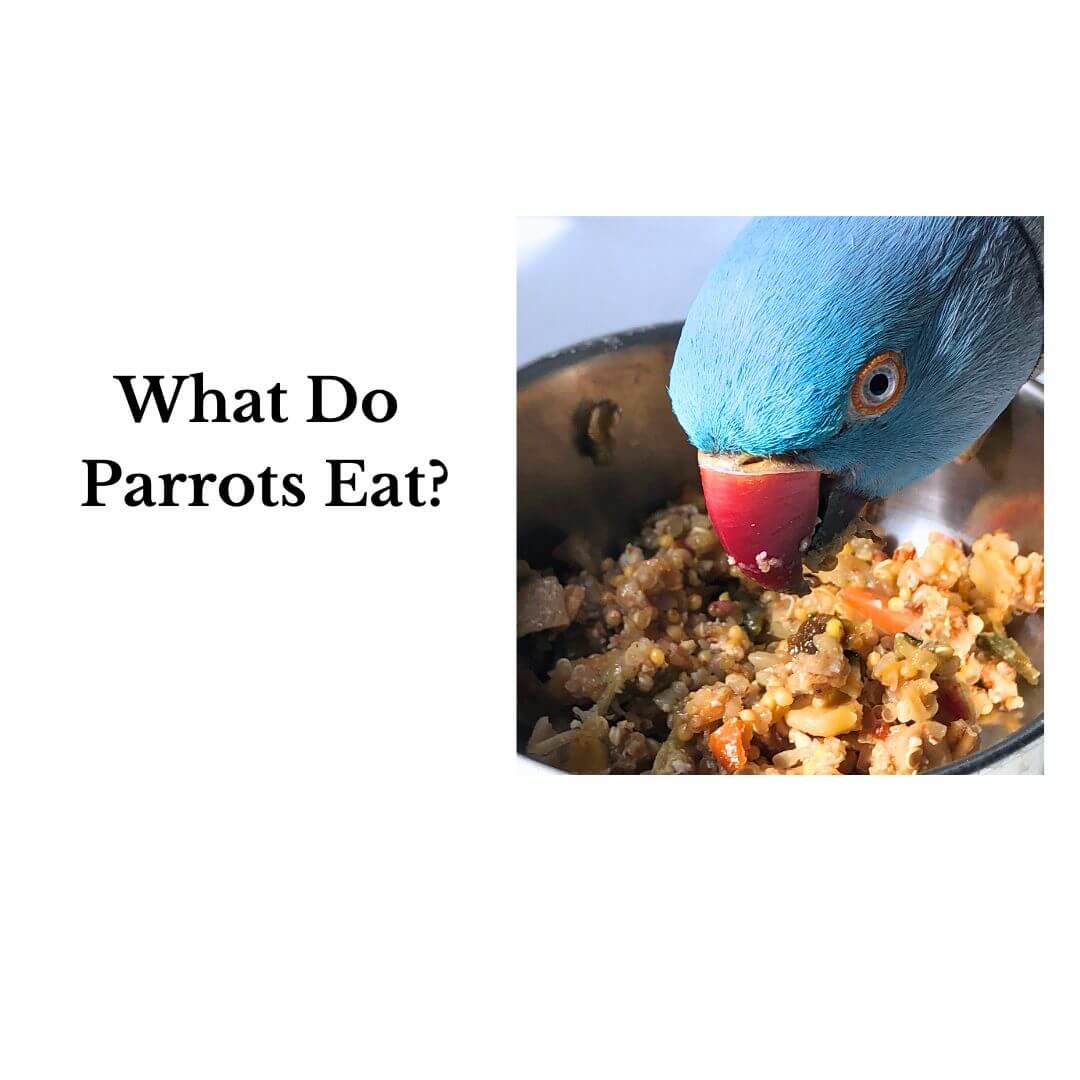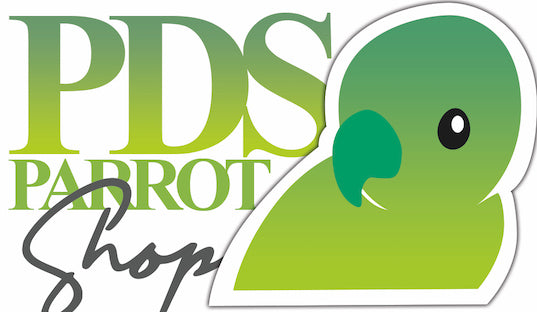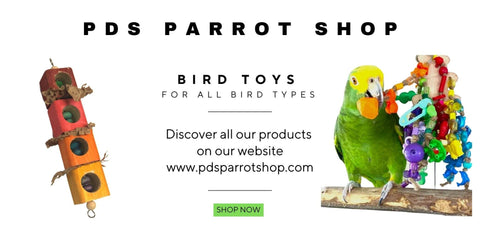
What Do Parrots Eat? The Best & Worst Foods for Your Bird
Share
Parrots are fascinating creatures known for their vibrant colors, intelligence, and the ability to mimic human speech. But have you ever wondered what fuels these extraordinary birds? What do parrots eat? Whether you’re a new parrot owner, an avian enthusiast, or just curious, understanding the dietary needs of parrots is crucial for their health and happiness. In The Science of Avian Nutrition, I explain that parrots require a diverse diet that goes beyond seeds so let’s dive into the colorful world of parrot diets and discover what keeps these birds chirping joyfully.
Give your parrot the best explore our selection of healthy bird food, crafted with your bird’s well-being in mind.
What Do Parrots Eat?
Parrots eat a variety of fresh fruits, vegetables, whole grains, and some seeds or nuts. A balanced diet should include leafy greens, berries, cooked grains, and protein sources like sprouted legumes.

Introduction to Parrot Diets
Parrots, like people, thrive on a varied and balanced diet. In the wild, their diet is diverse, encompassing everything from fruits and seeds to insects. This variety provides them with essential nutrients needed for their vibrant feathers, sharp minds, and overall health. For parrot owners, mimicking this natural diet is key to ensuring their pet’s well-being.
Natural Diet in the Wild
In their natural habitats, parrots are foragers. They fly through forests and savannas, picking and choosing from a buffet of foods. They consume seeds, nuts, fruits, berries, buds, and occasionally insects. This varied diet ensures they get a wide range of nutrients.
Seeds: The Traditional Choice but Unwholesome
Seeds have long been a staple in parrot diets. They are readily available and loved by parrots. However, feeding a parrot a diet solely of seeds can lead to nutritional deficiencies. Seeds are high in fat and can lead to obesity and other health issues if not balanced with other foods. Think of seeds as the chips of the parrot world – tasty but not very nutritious in large quantities.
For those interested in the why behind food choices, our avian nutrition reference book dives deep into nutrient needs and deficiencies.
Fruits and Vegetables: Fresh and Nutritious
Just like humans, parrots benefit from a diet rich in fruits and vegetables. These provide essential vitamins, minerals, and fibers. Fresh produce like apples, berries, carrots, and leafy greens can make up a significant portion of a parrot’s diet. Offering a rainbow of fruits and veggies ensures they get a broad spectrum of nutrients.
If you want to know how to apply these feeding principles to fresh food, check out our in-depth Bird Chop guide.
List of Safe Fruits and Vegetables for Parrots
Fruits Parrots Can Eat:

Vegetables That Are Safe for Parrots:

Preparing Fruits and Vegetables
Always wash fruits and vegetables thoroughly to remove pesticides. Chop them into manageable pieces. Rotate different types to keep your parrot interested and ensure a balanced intake of nutrients.
Pellets: Balanced Nutrition but Processed Food
Pellets are a commercially prepared food designed to meet all the nutritional needs of parrots. They can be an excellent way to ensure a balanced diet. Pellets are formulated to prevent selective eating – where parrots might pick out their favorite seeds or fruits and leave the rest. It’s like having a multivitamin in their meal. However, it's still essential to provide fresh foods with pellets, to provide variety and mental stimulation.
Nuts: A Tasty Treat
Nuts are a favorite among many parrot species. They are high in fat, so they should be given sparingly, but they are also a good source of protein and essential fatty acids. Offer nuts like almonds, walnuts, and pecans as treats or training rewards. Think of them as the occasional dessert in your parrot's diet.
Protein Sources for Parrots
Parrots require protein for muscle development and repair. Proteins can come from sources like:
- Fresh Fruits and Veggies:
- Legumes: Lentils, chickpeas, and beans.
Foods to Avoid: What Not to Feed Your Parrot
Certain foods can be harmful or even deadly to parrots. It’s crucial to know what to avoid:
- Chocolate: Toxic to parrots, causing heart problems and seizures.
- Avocado: Contains persin, which is toxic to birds.
- Caffeine: Can cause heart issues and hyperactivity.
- Alcohol: Toxic and can lead to poisoning.
- Salt: Excessive salt can lead to kidney problems.
- Onions: Can cause anemia and digestive issues.
- Uncooked Beads: Toxic (Lectins)
Hydration: The Importance of Water
Just like any other living creature, parrots need access to fresh, clean water at all times. Dehydration can lead to serious health issues. Ensure that water dishes are cleaned daily and filled with fresh water. Some parrots enjoy bathing, which can be a fun way to keep them hydrated and entertained.
Supplements and Vitamins
Sometimes, even a well-balanced diet might need a boost. Supplements and vitamins can help fill any nutritional gaps. Consult with an avian veterinarian before adding any supplements to ensure they are necessary and safe.
How Much and How Often to Feed
Determining the right amount and frequency of feeding can be tricky. Factors include the parrot's species, age, activity level, and health status. Generally, providing food in the morning and evening works well. Monitor their weight and adjust portions as needed to maintain a healthy weight.
Special Dietary Needs of Different Parrot Species
Different parrot species have unique dietary requirements. For instance:
- African Grey Parrots: Need higher calcium levels.
- Amazon Parrots: Prone to obesity, so their diet should be lower in fat.
- Budgerigars: Thrive on a diet high in seeds and grains.
Research the specific needs of your parrot species to tailor their diet accordingly. Try our Soak and Serve recipe.
Preparing Homemade Parrot Food
For those who enjoy a hands-on approach, preparing homemade parrot food can be a rewarding way to ensure a balanced diet. Recipes can include a mix of grains, legumes, and finely chopped vegetables. Avoid using salt, sugar, and artificial additives. Homemade food should supplement, not replace, a varied diet of pellets, seeds, and fresh produce.
Feed smarter, not harder. Try our Basic Bird Chop Recipe an easy, nutritious blend your bird will love.
Signs of a Healthy Diet
A healthy parrot will have vibrant feathers, clear eyes, and a lively demeanor. Other signs include:
- Consistent energy levels: Active and playful.
- Healthy weight: Neither too thin nor obese.
- Regular, well-formed droppings: Indicating good digestion.
If your parrot shows signs of poor health, consult a veterinarian to reassess their diet.
Understanding what parrots eat is crucial for their health and happiness. A varied diet that mimics their natural foraging habits is ideal. Understanding and catering to their dietary needs, you can help your parrot live a long, healthy, and happy life. By providing a balanced mix of seeds, fruits, vegetables, pellets, nuts, and proteins, along with plenty of fresh water, you can ensure your parrot thrives.
Cookbook
The Science of Avian Nutrition
More Articles on Bird Health
Organic vs Traditional Foods for Your Pet Bird: An Expensive Trend?
The Benefits of Fresh Food for Parrots
Author: Monika Sangar
Co-founder of Prego Dalliance Sanctuary, Artisan of PDS Parrot Shop
Monika Sangar is a parrot rescuer, bird food chef, and toy designer with over a decade of experience in avian care and nutrition. She is the founder of Prego Dalliance Sanctuary and the author of The Science of Avian Nutrition, a cookbook dedicated to fresh, healthy meals for parrots. Explore more bird care tips and bird toys at PDS Parrot Shop!

